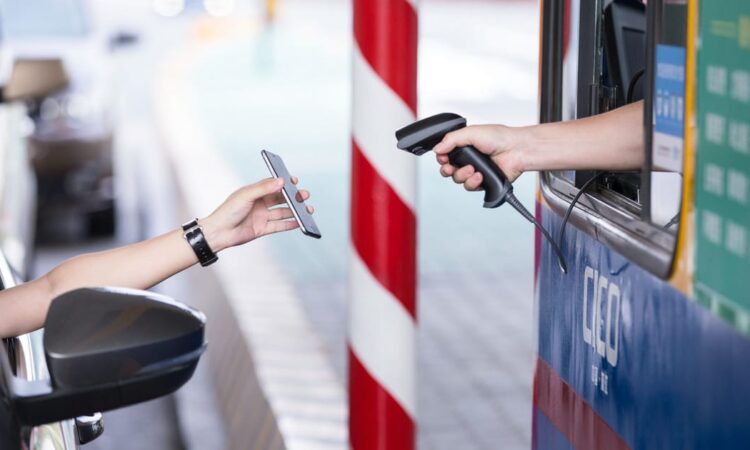
Press play to listen to this article
Voiced by artificial intelligence.
No cash? No plastic? No problem. Pay in digital euros.
The European Central Bank is experimenting with a digital euro that you can spend anywhere, without fear that someone is tracking your purchases.
The Frankfurt-based institution posted a questionnaire Monday evening to gauge the public’s appetite for a novel form of payment, following up a report it issued on October 2.
The ECB isn’t alone. Central banks across the globe are developing virtual versions of their currencies, as the use of physical cash diminishes.
Monetary authorities are determined to keep pace with the digital world of the 21st century, keeping an eye on private forms of money in development such as Libra.
The digital euro would complement your wallet, not replace anything in it.
A purely electronic euro wouldn’t come without risks. It could upend the financial industry as we know it, putting pressure on policymakers to develop a form of payment that is safe and attractive to citizens.
Here are five key questions about the merits and challenges to virtually minting a digital euro.
What is it?
The digital euro would complement your wallet, not replace anything in it.
Shopkeepers could accept it as an alternative to plastic or cash. Friends could borrow digital euros and pay them back anytime, anywhere.
Think of it like an electronic banknote that is stored on a wallet-like application on your smartphone, guaranteed by the ECB so one digi-euro is always worth the same as a one-euro coin.
You can’t lose it, either. The ECB would keep record of your digital euros, protecting you in case you lose your mobile.
Such a design would present a sharp distinction from cryptocurrencies such as Bitcoin, which has gyrated in value and seen some users victimized by cybertheft. It also would differ from stablecoins, which aim to prevent value fluctuations but depend on being backed by a basket of conventional currencies.
How would it work?
A digital euro might not look much different to you than viewing a bank account via your phone. A financial firm would provide an app that displays the number of digital euros you hold.
The back-end process of paying, however, would be very different.
In an electronic transfer today, the sender’s bank transmits a message to a clearinghouse, asking it to shift money from its account to the recipient’s bank. (For certain large or urgent payments, this can go directly to the ECB.) The clearing function has to verify the details, then arrange to debit the sender’s bank’s account at the ECB and credit the recipient’s. Choreographing the moves can take as long as two days until the money settles in the recipient’s account.

The European Central Bank is experimenting with a digital euro | Hannelore Foerster/Getty Images
A digital euro could in theory streamline the transaction at lower cost. The ECB could keep its own ledger, automatically tracking the owner of each digital cent. Or it could set rules for other ledger-keepers in a decentralized system, perhaps similar to the distributed ledger for Bitcoin, which records each transaction using blockchain technology.
No phone reception? You could even turn on Bluetooth and send a token, a sort of electronic IOU, that would update the ledger when back online.
Why now?
Two reasons. First, electronic payments are on the rise amid concerns that physical cash could carry the coronavirus. Second, the tech industry is developing its own forms of currency.
Libra is foremost in officials’ minds. The association, set up by Facebook and a group of other companies, is designing a payment service using stablecoins, a type of digital asset that the EU is proposing to regulate.
The venture has spooked policymakers that Libra could be available to Facebook’s 2.7 billion users — undermining the euro while leaving citizens’ finances vulnerable, both to foreign powers as well as companies collecting data on their spending habits.
An ECB digital euro would aim to mitigate those risks.
What’s the holdup?
A few safeguards are needed before the ECB could make digital euros available to the public. Without them, banks could be in real trouble.
For starters, savers might see more benefit in holding digital euros than depositing their money with banks, which charge fees for holding cash and don’t pay much interest at current rates.

Before rolling out the digital euro, the ECB needs to prevent nightmare scenarios for traditional banks | Toussaint Kluiters/AFP via Getty Images
But reducing deposits could have a downside for society. Banks depend on deposits as a vital source of funding and could end up having to charge more on loans, slowing economic activity.
Savers could also rush to go digital in a time of crisis, crippling the financial system even faster than conventional bank runs.
The ECB is working on figuring out how to prevent these scenarios. Ideas include limiting the digital euros anyone can hold or charging people for holding large amounts of them.
What else is there to consider?
Privacy and policing.
You can spend cash in hand without anyone tracking what you buy. Online and card payments, meanwhile, keep a record of your purchases.
Digital euros could aim for the best of both, by creating electronic fingerprints accessible only to authorities. It could protect people’s data while preventing criminals from moving around their illicit money.
The ECB will carry out in-house experiments for the next six months and decide mid-2021 on whether to launch the digital euro.
That might mean limiting big transfers of digital currency and tracking spending patterns that look suspicious.
Unlocking the identity of users could involve convincing multiple agencies holding different parts of a decryption key, which must come together to reveal the parties behind a transaction.
The ECB will carry out in-house experiments for the next six months and decide mid-2021 on whether to launch the digital euro. But with Libra coming as soon as this year, it’s unlikely central bankers will sit by idly.
Want more analysis from POLITICO? POLITICO Pro is our premium intelligence service for professionals. From financial services to trade, technology, cybersecurity and more, Pro delivers real time intelligence, deep insight and breaking scoops you need to keep one step ahead. Email pro@politico.eu to request a complimentary trial.




